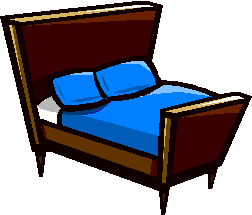 Sleep is a very important part of our day (and night). It is also one of the least understood parts of human physiology. Sleep is governed by circadian rhythms, which is the 24-hour cycle of our biological and physiological processes. Circadian rhythms are measured by the timing of the secretion of melatonin from the brain and core body temperature. Melatonin is secreted from about 9pm and prepares the body for sleep. It makes us feel sleepy and lowers the core body temperature. Melatonin secretion is inhibited by light and permitted by darkness. Core body temperature is lowest at 4:30 am, and it important to get 6 hours sleep before this time. That means that 10:30 is a good bedtime. The old saying “every hour before midnight is worth two after midnight” comes from this fact.
Sleep is a very important part of our day (and night). It is also one of the least understood parts of human physiology. Sleep is governed by circadian rhythms, which is the 24-hour cycle of our biological and physiological processes. Circadian rhythms are measured by the timing of the secretion of melatonin from the brain and core body temperature. Melatonin is secreted from about 9pm and prepares the body for sleep. It makes us feel sleepy and lowers the core body temperature. Melatonin secretion is inhibited by light and permitted by darkness. Core body temperature is lowest at 4:30 am, and it important to get 6 hours sleep before this time. That means that 10:30 is a good bedtime. The old saying “every hour before midnight is worth two after midnight” comes from this fact.
A good night of sleep does so many things for us, it is impossible to list them all, but some main ones are:
- Sleep improves wound healing.
- Our nervous system and musculoskeletal systems are rejuvenated whilst we sleep.
- Sleep loss impairs the immune system, and memory and contributes to many health problems such as depression, chronic fatigue syndrome, and fibromyalgia.
Yet sleep is the thing we often sacrifice first due to social commitments, work deadlines, or even just watching the Australian Open Tennis in January! One could argue that we need more sleep over the Christmas period, due to the extra parties and functions, the things at work that must be finished, and the sometimes poor diet (and drinking choices)! All of these things put extra stress on our bodies and sleep can go a long way to alleviate some of this stress.
To ensure you get a good night’s sleep at any time of the year follow these helpful tips:
- Go to bed at the same time each night and wake up at the same time each morning. It is often tempting to have a huge sleep in on the weekend but then this pushes the body clock back and makes it even harder to get up on Monday morning.
- Avoid daytime naps, no matter how tired you are. If you sleep through the day, it is less likely that you will sleep through the night.
- If you do wake up, get up & do something else that is relaxing & quiet until you feel tired again.
- Don’t read or watch TV in bed as these are too stimulating for the mind.
- Establish a regular exercise routine, preferably in the morning, of at least 30 minutes of cardiovascular activity on most days of the week, however try and avoid strenuous exercise in the evenings, especially 2 hours before bed.
- Alcohol and caffeine interrupt the circadian rhythms of the body and disrupt your brain waves, which end up interfering with your ability to sleep. Try to cut caffeine out of your diet. If you cant cut it out totally, then ensure you don’t have any 5-7 hours before bed. Cut out alcohol, especially 2-3 hours before bed.
- Try a cup of chamomile tea before bed to harness its relaxing properties.
- Try a few drops of lavender essential oil on your pillow at night to relax you as you drift off.
- Avoid having a big meal at night. Your body will be trying to digest your food and not focused on sleep.
And most importantly, if you regularly have trouble sleeping, seek the advice of your naturopath instead of popping a sleeping tablet. There are lots of herbs and nutrients that can help with a good night’s sleep.